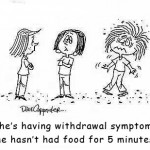

Paleo eating and vegan eating are the EXACT SAME THING.This is why any and all research on Paleo diets can be used for Vegan diets, and vice versa.It’s also why any personal experiences people have had with a Vegan diet can be directly applied to what you will probably experience with the Paleo Diet and vice versa.I mean, after all… they’re both ‘eating’ right?I hope this sounds crazy to you, because this is EXACTLY how I feel when people talk about different types of fasting.‘Fasting’ or ‘Fasting for weight loss’ is a very BROAD description of a style of ‘not eating’, just like ‘Eating’ or ‘Eating for weight loss’ can cover just about any diet in existence.All fasting is NOT the same, just like all styles of Eating are not the same.So, I’d like to give you my own way of clarifying this apparent confusion.These are my own definitions, but they have served me extremely well over the years…Long-term fasting: Abstinence from food or calorie intake for a period over 72 hours.Short-term fasting: Abstinence from food or calorie intake for a period of 72 hours or under.OK, so now that we’ve divided up fasting based on length, let’s look at much more confusing issue – Intermittent Fasting.Intermittent – Occurring occasionally or at regular or irregular intervals… so really “Occasionally”Fasting – Taking a break from eating (zero calorie intake) for a predetermined period of time without a necessary interval from one fast to the next.So Intermittent fasting becomes ‘Occasionally taking a break from eating’(Pretty simple eh?)But this is where people get confused… Or at least where I get confused.If you are spending MORE time NOT eating than you are eating in any given period of time (let’s say a week) why are you calling that Intermittent Fasting?In my eyes this cannot be defined as taking an occasional break from eating, in fact I think it should be defined as the opposite, and that would be “Intermittent Feeding”.Intermittent Feeding = Taking the occasional break from fasting to eat during a predetermined window.There are similar approaches but also very different approaches to fasting for weight loss.This is not an attempt to disparage this type of approach. Diets that are Intermittent Feeding can be fantastic, helpful, effective, but they can also be in some ways completely different than Eat Stop Eat.I feel that it’s not accurate to lump them together as the experience of doing a form of intermittent fasting is much different than intermittent feeding.In my opinion the sub-categories of IF need to make it into our way of thinking.LeanGains, The Renegade Diet and even some of the more extreme protocols along these lines (like fasting for 20 hours eating for 4 every day) – all can incredibly effective fat loss programs, but in my eyes (and I know you guys are going to hate this) NOT intermittent Fasting. To me they are more accurately described as Intermittent Feeding.Now, the benefits are very similar – simple, easy fat loss, no loss of muscle mass etc.The technique is similar; Don’t eat for a period of time.And they, along with most other kinds of IF probably share about 80% of the supporting research.But there are also some major differences that I feel is what merits this new definition – specifically the amount of time you are ‘allowed’ to eat, and because the ‘eating windows’ are different, you also have to approach your eating differently. The more ‘extreme’ the Intermittent Feeding, the short the eating window, the more you must eat with ‘purpose’ during that window.Each style shares some pros and cons, but also have other unique pros and cons.Sometimes there is research that applies to ALL types of fasting, sometimes it’s specific to one style or the other.The same goes with personal experience
Visit site:
Fasting for Weight Loss – Setting the Record Straight | Brad Pilon's …







 For now classes are 6pm and 640pm at 2840 Wildwood st in the Boise Cloggers studio.
Book your class NOW!
click this ==>
For now classes are 6pm and 640pm at 2840 Wildwood st in the Boise Cloggers studio.
Book your class NOW!
click this ==>








